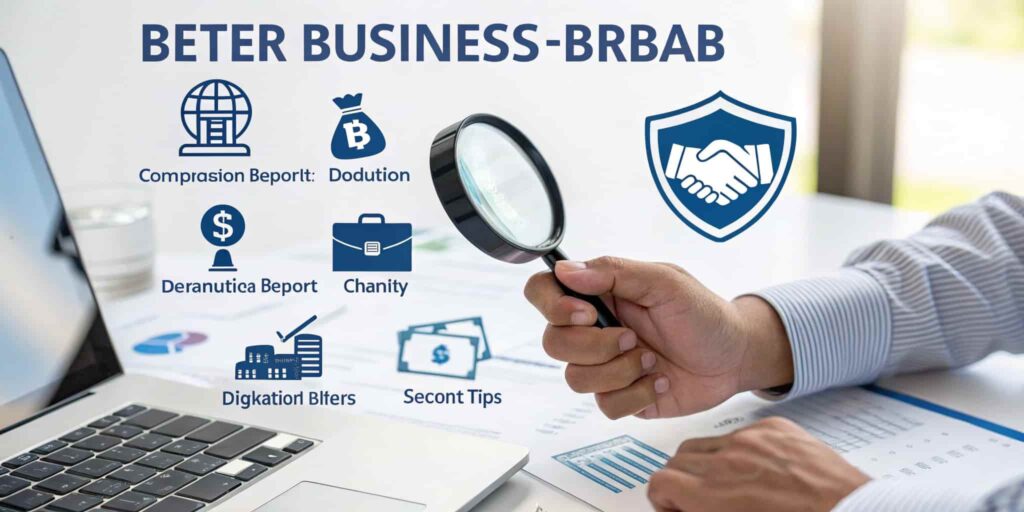In today’s fast-paced marketplace, choosing the right business can feel overwhelming. With so many options available, it’s difficult to know which companies truly prioritize customer satisfaction and ethical conduct. The Better Business Bureau (BBB) stands out as a trusted resource, helping both consumers and businesses foster fair and ethical practices. By providing reliable business ratings and facilitating dispute resolution, the BBB plays a vital role in creating a transparent marketplace.
Stay tuned with us, we will explores the key aspects of the Better Business Bureau, including its core functions, rating system, and its role in promoting consumer protection and business credibility. We will also highlight the benefits and challenges the organization faces and offer useful tips on how to make the most of the BBB’s services.
What Is The Better Business Bureau?
So, what exactly is the Better Business Bureau? The Better Business Bureau (BBB) is a non-governmental organization that aims to advance marketplace trust. It has been operating for over a century and provides a range of services to both businesses and consumers, primarily in the United States and Canada. While it is not affiliated with the government, its influence is significant in shaping consumer experiences and business reputations.

The BBB offers businesses an opportunity to be accredited based on their commitment to ethical practices, such as transparency, responsible advertising, and consumer dispute resolution. In addition to accreditation, the organization also provides ratings and facilitates the resolution of complaints lodged by consumers against businesses.
History of the Better Business Bureau:
The Better Business Bureau (BBB) was founded in 1912 as a nonprofit organization focused on promoting trust and integrity in the marketplace. Over the years, it has expanded across North America, helping businesses and consumers interact more transparently.
Initially, the BBB focused on truthful advertising but has since evolved to include business ratings, accreditation, consumer complaint resolution, scam tracking, and dispute mediation. While the BBB is not a government agency, its influence has grown significantly, making it a key player in consumer protection and business credibility.
Why Is The Better Business Bureau So Important?
Now, you might be wondering, why is the BBB so important? In today’s fast-paced and interconnected world, consumers have access to a wide array of businesses, both online and offline. This abundance of choice can make it difficult to distinguish reputable businesses from those that may engage in deceptive practices.
The BBB helps address this challenge by serving as a watchdog for ethical behavior and a mediator for disputes. Its mission is to promote “marketplace trust,” which benefits not only consumers but also businesses committed to maintaining high standards of integrity.
Here’s why this topic has everyone talking lately:
- Consumer Protection: The BBB provides a platform for consumers to voice their concerns and resolve disputes with businesses.
- Business Credibility: Businesses can earn BBB accreditation, signaling to consumers that they uphold ethical practices.
- Education: The BBB’s resources empower consumers to make informed decisions and avoid scams.
Must Check: What Business Did Larry Lourdemiller Own – Learn About His Empire!
How The BBB Rating System Works?
The Better Business Bureau (BBB) evaluates businesses using a 100-point scoring system, assigning ratings that range from A+ to F. The rating reflects a company’s business practices, complaint resolution efforts, and transparency, rather than the quality of its products or services.
Factors That Affect BBB Ratings:
The BBB evaluates businesses based on 13 key factors, including:
- Unresolved or unanswered complaints – Ignoring customer issues lowers ratings.
- Complaint volume – A high number of complaints in a short time reduces scores.
- Industry type – High-risk industries (e.g., debt collection) may receive lower ratings.
- Dispute resolution cooperation – Refusing mediation/arbitration can impact ratings.
- Legal actions – Lawsuits, fines, or government penalties lower scores.
- Advertising honesty – False or misleading ads negatively affect ratings.
- Business history – New businesses (under a year) may receive lower scores.
- Transparency & licensing – Lack of proper disclosure or licenses reduces ratings.
- Customer interactions – Responsiveness to feedback improves scores.
BBB Rating Scale:
Each factor contributes to a total score out of 100 points, which is then converted into a letter grade:
| Score Range | Letter Grade |
| 97 – 100 | A+ (Excellent) |
| 94 – 96.99 | A (Very Good) |
| 90 – 93.99 | A- (Good) |
| Below 90 | B+ to F (Varies based on performance) |
Key Takeaway:
A BBB rating does not guarantee that a company offers high-quality products or services. Instead, it reflects how a business operates, communicates, and resolves customer concerns.
Key Functions Of The Better Business Bureau – Building Consumer Confidence!
The BBB performs several critical functions that contribute to a healthier marketplace. Let’s break them down:
Rating Businesses:
One of the BBB’s most well-known services is its business rating system, which grades companies on a scale from A+ to F. These ratings are based on several factors, including:
- The number of complaints filed against the business.
- How effectively the business resolves those complaints.
- The business’s transparency and adherence to ethical practices.
This grading system helps consumers make informed decisions while encouraging businesses to improve their performance.
Consumer Complaint Resolution:
The BBB provides a platform for consumers to file complaints against businesses. These complaints are then forwarded to the businesses for resolution. This process is designed to promote accountability and foster open communication between parties. In many cases, disputes are resolved amicably, saving both time and resources.
Business Accreditation:
Businesses can choose to become BBB Accredited by meeting specific standards, such as:
- Transparency in operations.
- Proper licensing.
- Adherence to advertising codes.
- Resolution of consumer complaints.
Accreditation is a voluntary process but serves as a powerful signal to consumers that the business is committed to ethical practices.
Educational Resources:
The BBB offers a wealth of resources to educate consumers and businesses. These include:
- Business Profiles: Detailed information about businesses to help consumers make informed choices.
- Charity Reports: Insights into the practices and financial transparency of charitable organizations.
- Consumer Tips: Guidance on avoiding scams, recognizing unethical practices, and navigating complex transactions.
What’s the Difference Between BBB-Accredited and Non-Accredited Businesses?
The Better Business Bureau (BBB) rates both accredited and non-accredited businesses, but there are key differences between them.
| Feature | BBB-Accredited Business | Non-Accredited Business |
|---|---|---|
| Requires Payment? | Yes (Fees start at $500) | No |
| BBB Rating? | Yes | Yes |
| Listed on BBB Website? | Yes | Yes |
| Receives BBB Accreditation Seal? | Yes | No |
| Must Follow BBB Standards? | Yes (Must meet ethical guidelines) | No |
| Subject to BBB Monitoring? | Yes (Regular evaluation) | No |
| Access to BBB Dispute Resolution? | Yes | Limited |
| Greater Consumer Trust? | Yes | No official endorse |
Must Check: Peste Business Park Shelton WA – The Ideal Space For Business Growth!
What Services Does The Better Business Bureau Provide?
When it comes to ensuring trust and accountability in the marketplace, the Better Business Bureau (BBB) offers a variety of services that benefit both consumers and businesses. These services are designed to help individuals make informed decisions and foster positive relationships between businesses and the public. Let’s take a closer look at what the BBB offers:

Business Profiles:
One of the most useful services the BBB provides is detailed business profiles. These profiles give consumers insight into a business’s history, BBB rating, consumer complaints, and how those complaints were resolved. This helps shoppers make informed decisions about which businesses they can trust.
Business Accreditation::
For businesses that meet the BBB’s high standards, the organization offers accreditation. This means that the business has demonstrated a commitment to ethical practices, transparency, and resolving consumer complaints. BBB accreditation gives businesses credibility and shows consumers they are trustworthy.
Consumer Complaint Resolution
Another key service offered by the BBB is the consumer complaint resolution process. If a consumer is unhappy with a product or service, they can file a complaint with the BBB. The organization then acts as a mediator, facilitating communication between the consumer and the business to reach a fair resolution.
Charity Reports:
The BBB also offers charity reports through its Wise Giving Alliance. These reports assess charities based on how well they follow ethical standards, ensuring that donors can make informed decisions when contributing to a cause. This is especially important in a world where scams and fraudulent charities are prevalent.
Consumer Education:
The BBB is dedicated to helping consumers make smarter decisions. They provide a wealth of consumer education resources, including tips on how to recognize scams, protect personal information, and understand rights in the marketplace. This empowers consumers to avoid common pitfalls and make better choices.
Scam Tracker:
To further support consumers, the BBB operates a Scam Tracker. This tool allows individuals to report scams they’ve encountered, helping others stay alert to potential threats. The Scam Tracker also helps the BBB track patterns of fraudulent activities across different regions.
Business Dispute Services:
In addition to consumer complaints, the BBB also helps resolve disputes between businesses. If two businesses have a disagreement, the BBB can mediate the situation and help them reach an agreement, encouraging a fair and professional resolution.
How Businesses Benefit From BBB Accreditation?
When businesses earn Better Business Bureau (BBB) accreditation, they gain access to several advantages that can enhance their reputation and help them grow. Here’s how businesses benefit from BBB accreditation:
- Increased Consumer Trust: Being BBB accredited signals to consumers that a business follows high ethical standards and is committed to resolving customer complaints. This trust can be a powerful factor in attracting new customers and retaining existing ones.
- Enhanced Reputation: The Better Business Bureau is widely recognized as a symbol of credibility. Accreditation can significantly improve a business’s reputation, as consumers often view accredited businesses as more trustworthy and reliable compared to non-accredited ones.
- Access to BBB Resources: Businesses that are BBB accredited gain access to valuable resources, including a business profile on the BBB website, where they can showcase their good standing and provide details to potential customers. This visibility helps businesses stand out in a competitive marketplace.
- Mediation Services: Being part of the BBB network means businesses can benefit from the BBB’s dispute resolution services. If conflicts arise with customers, the BBB can help mediate and facilitate a fair resolution, preserving the business’s reputation and customer relationships.
- Increased Customer Loyalty: Consumers are more likely to remain loyal to a business that is BBB accredited because it demonstrates a commitment to transparency and ethical practices. Businesses with BBB accreditation often see long-term customer loyalty as they maintain high levels of trust and satisfaction.
- Marketing Advantage: BBB accreditation serves as an effective marketing tool. The Better Business Bureau logo can be used in advertising, on websites, and in social media posts to signal to potential customers that the business adheres to high ethical standards. This can increase customer confidence and ultimately drive sales.
Must Check: Dl200 A350 Business Class – Why It’s The Best Way To Fly!
How The Better Business Bureau Supports Consumers?
The Better Business Bureau (BBB) plays a crucial role in supporting consumers by offering a range of services that promote trust and transparency in the marketplace. First and foremost, the BBB provides a platform for consumers to file complaints against businesses, helping to resolve issues quickly and fairly.

In addition, the BBB offers business ratings so consumers can make informed decisions when choosing where to shop or do business. Beyond that, the BBB helps protect consumers from scams by providing resources and tools like the Scam Tracker to report and track fraudulent activities. The BBB acts as a reliable resource, ensuring that consumers have the support and information they need to make safer and more confident choices.
Criticism And Challenges Faced By The Better Business Bureau – Is It Still Relevant?
While the Better Business Bureau (BBB) plays a key role in promoting trust and transparency, it has also faced some criticism and challenges over the years. Let’s explore some of the main concerns:
- Perception of Bias: One common criticism is that some people believe the BBB favors businesses that pay membership fees, potentially leading to biased ratings. However, the BBB argues that its ratings are based on objective factors such as complaint history and resolution.
- Transparency Issues: There have been concerns that the rating system is not always transparent enough, especially when it comes to how complaints are weighed in the final score. Some businesses have expressed frustration with the lack of clarity on how ratings are determined.
- Limited Authority: The BBB lacks the power to enforce penalties on businesses that violate its standards. This has led some to question the effectiveness of the organization, as it can only mediate disputes but cannot impose legal consequences.
- Slow Response to Complaints: Another challenge is that some consumers feel that the BBB’s response time to complaints can be slow, leading to frustration. While the BBB works to mediate disputes, the process may not always be as quick as some consumers would like.
- Mixed Public Perception: Some businesses and consumers still question the overall value of BBB accreditation, especially when it comes to whether it truly impacts consumer behavior. This has made it harder for the BBB to convince all businesses and consumers of its importance.
How To File A Complaint With The Better Business Bureau?
If you find yourself having an issue with a business and want to file a complaint, the Better Business Bureau (BBB) offers a simple and straightforward process. First, visit the BBB website and search for the business you’re having trouble with. Once you’ve found the business’s profile, you’ll see an option to file a complaint.
After submitting your complaint, the BBB will forward it to the business, who will then have the opportunity to respond. The BBB will assist in mediating the issue and help both parties work toward a fair resolution. Keep in mind that promptly providing all relevant information will help speed up the process and increase the chances of resolving the matter successfully.
Must Check: Business Texting Service 10464 – Transform Your Marketing Strategy!
How To Use The Better Business Bureau To Avoid Scams?
Using the Better Business Bureau (BBB) can be a great way to protect yourself from scams and avoid falling victim to fraudulent businesses. Here are some practical ways to use the BBB to stay safe:
- Check Business Ratings and Reviews: Before making a purchase or hiring a service, check the BBB rating of the business. This helps you see how other consumers have rated the business and whether it has a history of complaints or issues.
- Look for BBB Accreditation: When a business is BBB Accredited, it means they meet specific ethical standards and have a commitment to resolving customer complaints. This can help ensure you’re dealing with a trustworthy company.
- Report Suspicious Activities: If you encounter a suspicious business or a scam, report it using the BBB Scam Tracker. By doing so, you’ll help protect others from falling into the same trap.
- Read BBB Scam Alerts: The BBB regularly posts updates about common scams. By keeping an eye on these alerts, you can stay informed and avoid becoming a target of fraud.
By using these tools, you can significantly reduce the risk of encountering scams and make more confident decisions when engaging with businesses. The BBB provides valuable resources that can help keep you safe and informed.
Future Trends And Possibilities For The Better Business Bureau – What’s Next!
Looking ahead, the Better Business Bureau (BBB) is expected to adapt and evolve to meet the changing needs of consumers and businesses. As more people turn to digital platforms for their shopping and services, the BBB will likely focus on expanding its online presence. This could include offering more virtual tools to help consumers check ratings, file complaints, and stay informed about scams.

Additionally, with growing concerns around online scams and fraud, the BBB may increase efforts to monitor digital marketplaces and help protect consumers in this space. As technology continues to change the way we do business, the BBB will play an essential role in fostering trust and ensuring ethical practices remain a priority.
Frequently Asked Questions:
Is the BBB affiliated with the government?
No, the Better Business Bureau is a private nonprofit organization. It operates independently of any government agency, but it works with businesses and consumers to promote ethical practices in the marketplace. This neutrality ensures the BBB can focus on business integrity and consumer trust.
What happens if a business doesn’t respond to a complaint?
If a business fails to respond to a consumer complaint, it can negatively impact its BBB rating. The BBB encourages businesses to resolve complaints and communicate with customers to improve trust. If issues go unresolved, the business may face consequences such as a poor rating.
Can a business lose its BBB accreditation?
Yes, businesses can lose BBB accreditation if they fail to meet the required standards, such as resolving customer complaints or operating ethically. A loss of accreditation can hurt a business’s reputation, as it signals noncompliance with BBB guidelines.
Is BBB membership the same as BBB accreditation?
No, BBB membership is different from accreditation. Membership means a business is part of the BBB network, while accreditation indicates that the business meets certain ethical standards. Accreditation is a more formal recognition of a business’s trustworthiness and ethical practices.
Does the BBB guarantee the quality of a business’s products or services?
No, BBB accreditation or rating does not guarantee the quality of a business’s products or services. It only reflects the business’s practices in areas like customer service and ethical behavior. Consumers are encouraged to do their own research before making a purchase.
Conclusion:
The Better Business Bureau plays a vital role in fostering trust and transparency in the marketplace. By providing business ratings, facilitating complaint resolution, and offering valuable consumer resources, the BBB empowers individuals to make informed decisions and helps businesses build strong reputations.
While facing challenges such as perceived bias and limited authority, the BBB continues to adapt and evolve to meet the changing needs of consumers and businesses in an increasingly digital world.
Never Miss: